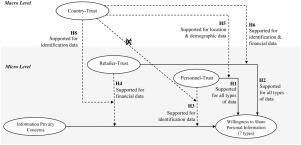Journal of Retailing ( IF 8.0 ) Pub Date : 2020-09-12 , DOI: 10.1016/j.jretai.2020.08.002 Monica Grosso , Sandro Castaldo , Hua (Ariel) Li , Bart Larivière

|
The relationship between consumers’ privacy concerns and their willingness to disclose personal information to retailers is more complex than a simple negative one. The multi-faced context, within which privacy decisions take place, shapes and bounds this relationship. Drawing on privacy contextual integrity theory, we model the privacy decisions as influenced by individuals’ multilevel trusting surroundings, which include trust in a retailer and in its personnel at the micro-level, and trust in a country at the macro-level. Based on 22,050 survey data across seven product categories in fourteen countries, our Bayesian multilevel modeling reveals that micro- and macro-level trust may promote consumers’ disclosure intentions via three mechanisms: (1) micro-level trust positive effect on consumers’ willingness to disclose their data; (2) micro-level trust effect by attenuating privacy concerns’ negative influence on this willingness; and (3) the positive indirect effect of trust in the country on both the direct and indirect impacts of trust in a retailer and in its personnel. Interestingly, trust’s direct effects are found in all the investigated types of information (i.e., identification, medical, financial, locational, demographic, lifestyle, and media usage data), whereas the indirect effects are found to vary across information types. Our post-hoc cluster analysis shows that different retail contexts can be classified into three clusters and help retailers understand whether they should invest in developing both trust in their retail company and in their personnel, or mainly on one of the two. By taking different types of trust and context effects into consideration, our findings help different retailers encourage customers to disclose their data with them.
中文翻译:

购物者共享什么信息?人员,零售商和国家/地区信任对共享信息意愿的影响
消费者的隐私问题与他们向零售商披露个人信息的意愿之间的关系比简单的消极因素更为复杂。在其中进行隐私决策的多面环境中,塑造并限制了这种关系。基于隐私上下文完整性理论,我们对受个人多层次信任环境影响的隐私决策进行建模,其中包括对零售商及其人员的微观信任,以及对国家/地区的宏观信任。基于对14个国家/地区中七个产品类别的22,050个调查数据,我们的贝叶斯多层次建模表明,微观和宏观信任可以通过三种机制促进消费者的披露意图:(1)微观信任对消费者的意愿产生积极影响披露他们的数据;(2)通过减轻隐私问题对该意愿的负面影响来实现微观信任效应;(3)信任国家对零售商及其员工信任的直接和间接影响所产生的积极间接影响。有趣的是,在所有调查的信息类型(即身份,医疗,财务,位置,人口,生活方式和媒体使用数据)中都发现了信任的直接影响,而在各种信息类型中发现了间接影响。我们的事后集群分析表明,不同的零售环境可以分为三个集群,可以帮助零售商了解他们是否应该投资发展对零售公司和员工的信任,或者主要是对两者之一的信任。通过考虑不同类型的信任和上下文影响,











































 京公网安备 11010802027423号
京公网安备 11010802027423号